You don’t need to be able to hold your breath for minutes to enjoy freediving. Below the Scuba Diver Girls’s Margo Sanchez explains why diving without gear can lead to the best underwater experiences.
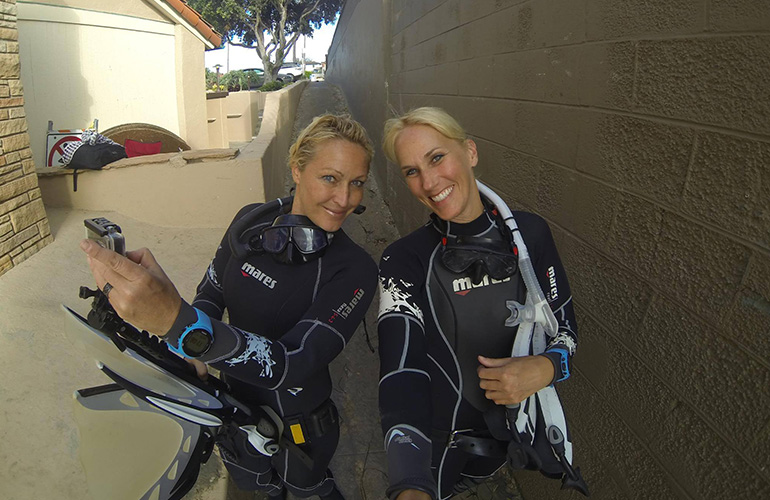
Scuba Diver Girls Stephanie Adamson & Margo Sanchez are based in California. © Scuba Diver Girls
Why freedive?
There is something very freeing about diving without heavy gear. It is a magical experience when you drop down into the silence of the ocean, but hear the distant chirp of a dolphin or crackling of shrimp. The sport gives myriad benefits over time. Learning the breathing and relaxation techniques teaches you how to relax your mind and body in many situations, both in and out of the water. After practicing, you get more proficient at using those techniques and can challenge yourself to extend the amount of time you can stay under the water.
Press play and watch a harbour seal play with the Scuba Diver Girls
How did you get into it?
I started out scuba diving and gained my passion for the underwater world with a tank on my back. But it wasn’t until I started diving with sharks that I realized I was not able to get close while I was blowing bubbles loudly on open circuit. I decided to try taking off my tank and diving down with them while holding my breath instead. Once I realized that this brought a whole new dimension to my diving, I decided to take the beginner freediving training with SSI (Scuba Schools International).
“As you swim through the forest, the sun streams through the kelp canopy like stained glass.”
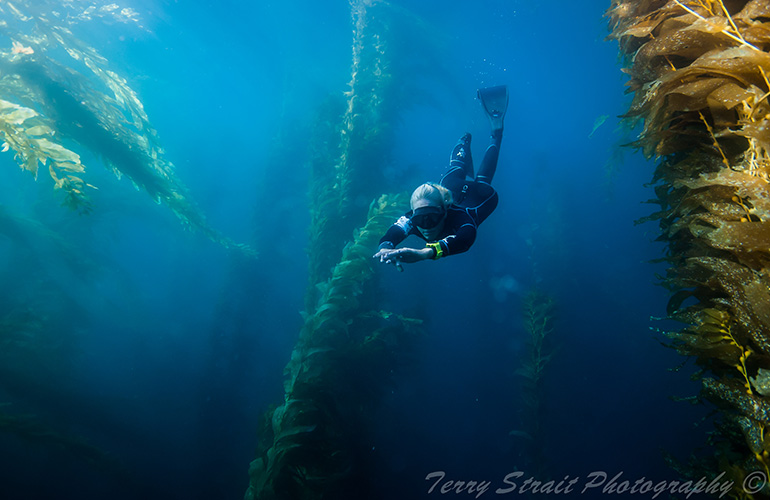
Best freediving experiences?
We have been all over the world both scuba and freediving. There are beautiful coral reefs in remote locations of the world that are breathtaking as you skim along the top checking out the little critters that flit in and out. Waking up at dawn in tropical locations to silently slip into the water and then skimming across the surface, looking for what the location has to offer, before finally gliding through its depths is one of the most exciting experiences a diver can have.
Click play to see the beauty of our underewater world and the freedom found in exploring it
Stop, you’re making us jealous! But go on anyway…
Probably my favorite place to freedive is right in our back yard in La Jolla California. Dropping down beneath the surface into a thriving kelp forest is an ethereal experience. As you swim through the forest, the sun streams through the kelp canopy like stained glass and a multitude of fish congregate while you swim by. Sometimes you get a visit from a frisky sea lion or a harbor seal tugging on your long fins while other times you swim gracefully alongside a sleek grey shark while it looks into your eye and you hold a common respect for each other through that connection. Most of these sea life encounters can only be experienced on a breath hold and a dive.
“Most of these sea life encounters can only be experienced on a breath hold and a dive.”
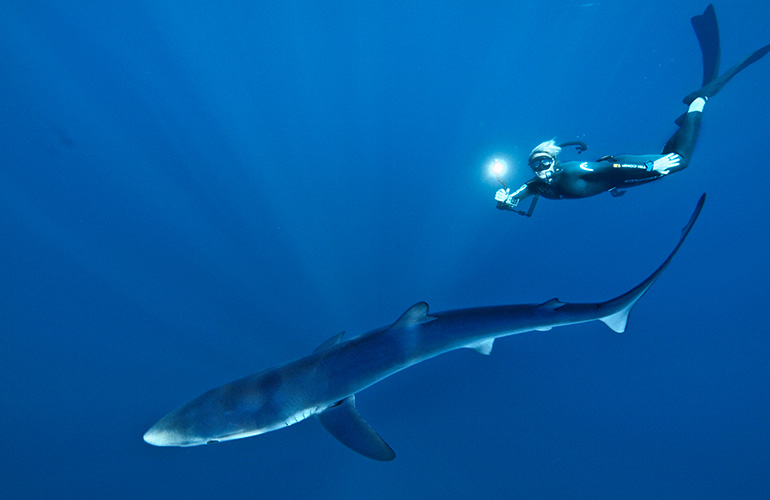
© Lesley Grey Alstrand
How do I learn?
Starting out by snorkeling is a great first step. Finding an instructor is next. There will be some out of the water training first for the diver to better understand how freediving impacts the body. For example, what the ‘mammalian diving reflex’ does once in the water, what a diaphragm spasm is and how you should react to it and what the importance of clearing the ears and how often is etc. These principles are important as a foundation so that when you get into the water, you understand what is happening with your body as you dive.
Golden safety rules?
The most important is always dive with a partner. Understanding your body’s limitations and physical reactions to breath hold is also important. Which is why this is a progressive sport. It is important to learn about your body before progressing to the next depth or time threshold.
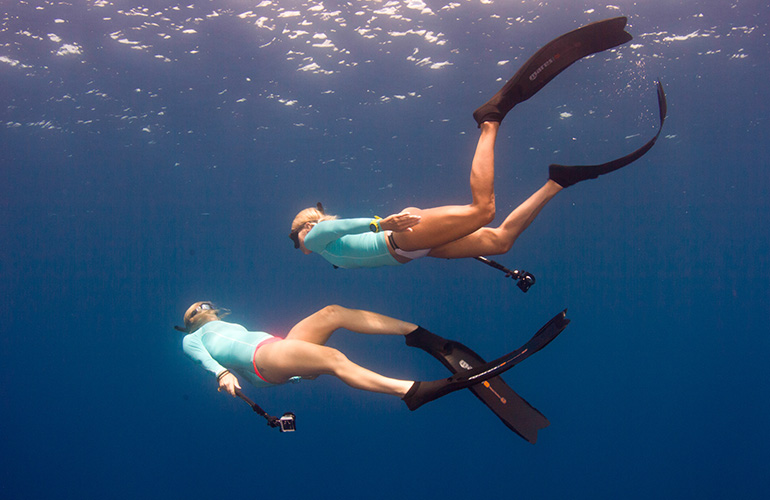
© Ashley Hauck
Greatest challenges?
There are two big challenges that may come as a surprise when a new diver begins. First, freediving is very mentally challenging. It’s natural to feel anxiety when holding your breath under water. Learning how to calm your mind is important. The second big challenge that many people face is ear trouble. Your ears are very sensitive and when you dive under the water it’s important to learn and understand not only the technique to clear them effectively, but how often.
“Since I started freediving, I am more relaxed, happy and in shape than I have ever been.”
Anything else?
The first goal is to have fun! A freediver should first enjoy the experience. This means taking the training at your own pace and not setting unrealistic goals for yourself in holding your breath or going to greater depths.
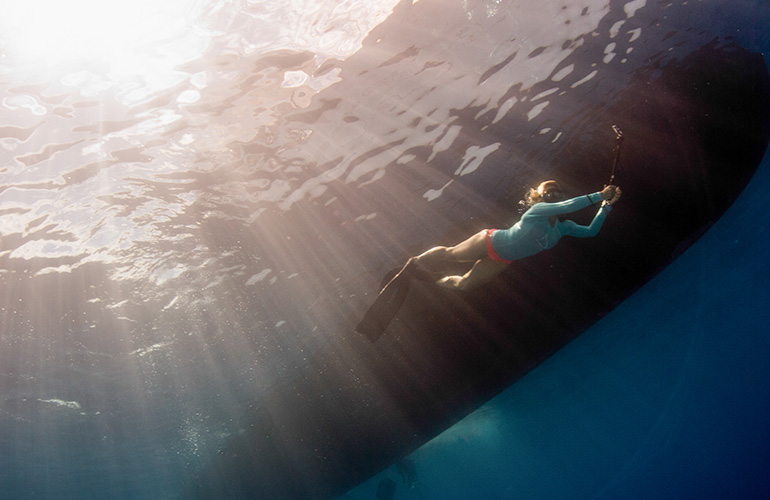
© Ashley Hauck
What else do you get from freediving?
Not only do the techniques and breath hold skills assist me in enjoying some of the most amazing sea life, but they also help me in my everyday life with stress management. Since I started freediving, I am more relaxed, happy and in shape than I have ever been. The sport brings peace to your life through the silence of the underwater world.